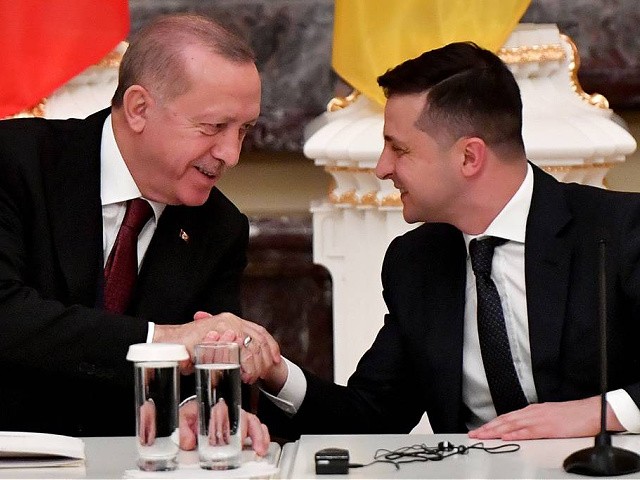Turkish Islamist strongman Recep Tayyip Erdogan used his address before the United Nations General Assembly on Tuesday to renew his calls for expanding Security Council membership, claim that his country had “actually fought the biggest battle against ISIS,” and politely suggest to genocidal China to recognize the rights of its Muslim population.
Erdogan also used his remarks to express gratitude to countries that donated humanitarian aid in the aftermath of the devastating series of earthquakes in his country in February, assume a leadership role in resolving the Russian invasion of Ukraine, and declare the wave of Quran burnings in Europe, where it is legal under freedom of expression protections, “intolerable.”
The Turkish leader spoke on the first day of the Assembly, an annual gathering to which all heads of government are invited. Tuesday’s guest list featured some of the most highly anticipated speakers of the week, including American President Joe Biden and Ukrainian President Volodymyr Zelensky. As per tradition, the president of Brazil, Luiz Inácio Lula da Silva, was first among chief executives to speak.
Erdogan spoke extensively on conflicts in the Middle East — particularly, the ongoing humanitarian disaster in Syria following a decade of civil war — but went on to discuss Turkey’s ties to Africa, Latin America, and the West in a speech that lasted over 35 minutes. The United Nations gingerly suggests a “voluntary” 15-minute time limit for General Assembly general debate speakers.
Erdogan, fresh off of yet another victory in an “election” widely derided as both unfree and unfair, began his remarks lamenting the “increasingly complex and dangerous challenges” the world faces, and led with his attempts to negotiate a way for Ukraine to ship grain to Africa and the Middle East despite Russian military activity in the Black Sea.
“Since the beginning of the Russian-Ukrainian War, we have been endeavoring to keep both our Russian and Ukrainian friends around the table with the thesis that war will have no winners and peace will have no losers,” Erdogan said. “We will step up our efforts to end the war through diplomacy and dialogue on the basis of Ukraine’s independence and territorial integrity.

Ukrainian President Volodymyr Zelensky and his Turkish counterpart Recep Tayyip Erdogan shake hands during a joint press conference following their meeting in Kiev on February 3, 2020. (SERGEI SUPINSKY/AFP via Getty Images)
Erdogan’s tone turned far less conciliatory on the issue of Syria, where he has maintained an invasion to the nation’s west intended to eradicate Syrian Kurdish groups that allied with the United States to fight the Islamic State at the height of its “caliphate” based in Raqqa. The Turkish invasion has significantly interfered with the Kurds’ ability to maintain security operations against the Islamic State, a reality Erdogan obscured by claiming that Turkey — not the U.S. and its allies — was responsible for the demise of the “caliphate.”
“The biggest threat to Syria’s territorial integrity and political unity is the support given to terrorist organizations guided by the powers that have designs on this country,” Erdogan asserted, an apparent dig at America for its cooperation with the anti-jihadist Syrian Democratic Forces (SDF), led by the Syrian Kurdish People’s Protection Units (YPG). Erdogan considers the YPG indistinguishable from the Kurdistan Workers’ Party (PKK), a U.S.-designated terrorist organization with Marxist leanings that occasionally organizes attacks in Turkey.
“As the leader of a country that has actually fought the biggest battle against ISIS, inflicted the biggest losses on this organization, and knows the realities in front of and behind the problem, I want to speak very clearly and frankly,” Erdogan continued. “We are sick and tired of the hypocrisy of those who use ISIS and similar organizations as a front to their own political and economic interests in the Middle East, North Africa, the Sahel, but especially in Syria and Iraq.”
“Countries that continue to work with terrorist organizations for their own political and economic interests have no right to complain about terrorism and its problems,” he asserted.
In reality, Turkey did not play a significant role in the fight against the ISIS “caliphate” and Erdogan faced several credible accusations of aiding jihadist organizations during the conflict.
In his discussion of Turkey’s bilateral relations with other countries, Erodgan made a reference to the Uyghur population of occupied East Turkistan, which has faced an ongoing genocide campaign by communist China since at least 2019. While Erdogan has described the communists’ treatment of Uyghurs as “genocide” in the past, he abstained from doing so on Tuesday, and instead expressed “sensitivity” to human rights violations against that population.
“We emphasize at every opportunity that we respect China’s territorial integrity and sovereignty,” Erdogan said. “However, we will continue to express our sensitivity regarding the protection of the fundamental rights and freedoms of Uyghur Turks, with whom we have strong historical and humanitarian ties.”
Erdogan concluded by accusing the West of “suffering from racism as if it were a plague as well as xenophobia, islamophobia.” Citing the recent trend of Quran burnings in Europe, he claimed such acts were “unbearable” and “dangerous.”
“Unfortunately, populist politicians in many countries continue to play with fire by encouraging such dangerous trends,” Erdogan said. “The mentality that encourages the heinous attacks against the holy Quran in Europe by allowing them under the guise of freedom of expression is essentially darkening its own future with its own hands.”


